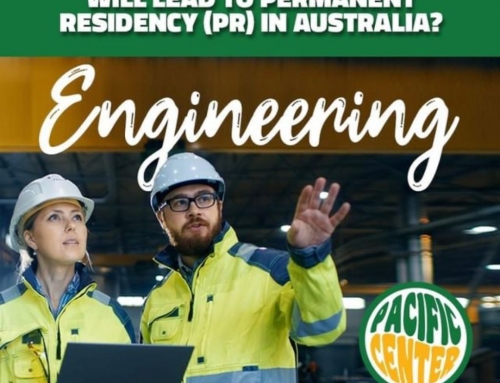COOK PATHWAY TO PR
If you have finished your course to become a cook, these are the options you have available to apply for an Australian Permanent Residency.
Firstly, it is important to check that your course is CRICOS approved. You can check if your course is CRICOS approved on https://cricos.education.gov.au/Course/CourseSearch.aspx
What are your pathways to PR as a Cook?
After completing your diploma, you have various options.
- Apply for a subclass 407 Training Visa– temporary
- Apply for an Employer-Sponsored Visa (if you have relevant experience) – temporary
- Apply for General Skilled Migration – Permanent
Subclass 407 Visa
- The 407 visa allows you to complete work-based training.
- You are required to have a sponsor who can provide the training. The training types must either be:
- Occupational training to improve skills for a cook.
- Occupational training for capacity building overseas is for overseas students who want to complete a placement in Australia.
- Meet health and character requirements.
Employer-Sponsored Visa Options
The employer you choose to work for is important. They are required to meet the following caveats:
The position cannot be involved in mass production in a factory setting.
The position must not be in a limited-service restaurant.
Limited-service restaurants include:
- fast food or takeaway food services
- fast-casual restaurants
- drinking establishments that offer only a limited food service
- limited service cafes including, but not limited to, coffee shops or mall cafes
- limited-service pizza restaurants.
Your role in the restaurant is equally important. The difference between the occupations of cook and cooks is made based on 2 main elements:
- the specific tasks of the nominated position and corresponding skill level; and
- the work environment
Fundamentally, a cook’s primary role is one of cooking, whereas that of a chef is managing the kitchen with some limited, specialised cooking tasks. Some of the duties of a cook are:
- Examining foodstuffs to ensure quality
- Regulating temperatures of ovens, grills and other cooking equipment
- Preparing and cooking food
- Seasoning food during cooking
- Portioning food, placing it on plates, and adding gravies, sauces and garnishes
- Storing food in temperature-controlled facilities
- Preparing food to meet special dietary requirements
- May plan menus and estimate food requirements
Fundamentally, a cook’s primary role is one of cooking, whereas that of a cook is managing the kitchen with some limited, specialised cooking tasks.
If you have a sponsor, you may be eligible to apply for these visas:
Subclass 482 – TSS Visa (Short Term Stream)
- Have at least 5.0 in IELTS.
- Have at least 2 years of working experience as a Cook.
- Receive a salary of at least $53,900 and meet the market salary rate
- Apply for skills assessment
Before Applying
Am I elegible for apply skill assessment?
To apply for a TSS or OSAP Skills Assessment with William Angliss Institute, you will need to meet the following requirements:
- Have current culinary experience, skills and knowledge in Western cuisine
- Be employed in your nominated occupation in a full-time paid capacity for a minimum of 12 months within the past 3 years prior to lodging your application.
- Have original and verifiable documentary evidence of all your employment and relevant education and training qualifications.
- Have a minimum of 3 years of full-time paid experience in your nominated occupation (if you have undertaken relevant formal studies/training), or;
- Have a minimum of 5 years of full-time paid experience in your nominated occupation (if you have not undertaken any relevant formal studies/training previously).
How much experience do I need to have to be eligible to apply?
While in the industry it may be common to refer to cooks working in a professional kitchen as ‘chefs’, for the purpose of the TRA Skills Assessment program, the nominated occupation of CHEF refers to applicants employed in a Head/Sous Chef role with kitchen management responsibilities. If you currently report to a Head/Sous Chef in your workplace, you are considered as a COOK for your Skills Assessment.
You must be able to provide satisfactory supporting documentary evidence of your current and previous employment to substantiate your experience. Unpaid or unverifiable employment will not be eligible for consideration.
If you have completed relevant formal training for your occupation, you must be able to provide academic transcripts and qualifications/certificates as evidence.
Please note that when determining the minimum work experience you are required to have to be eligible to apply, qualifications attained via Recognition of Prior Learning (RPL) are not categorised by WAI as formal studies/training.
Minimum Work Experience Required For Candidates with Formal Studies/Training:
Cooks/Pastrycooks/Bakers- Minimum of 3 years full-time paid employment as a COOK/PASTRYCOOK/BAKER (eg. Commis/Demi/Chef de Partie/Senior Chef de Partie/Pastrycook/Baker)
- Minimum of 1-2 years of full-time paid employment as a CHEF/PASTRY CHEF (eg. Sous Chef/Head Chef/Head Pastry Chef) with kitchen management responsibilities, and with an additional 5 years of full-time paid employment progressing from a Commis to Sous/Head Chef position.
Minimum Work Experience Required For Candidates without Formal Studies/Training:
Cooks/Pastrycooks/Bakers- Minimum of 5 years full-time paid employment as a COOK/PASTRYCOOK/BAKER (eg. Commis/Demi/Chef de Partie/Senior Chef de Partie/Pastrycook/Baker)
- Minimum of 1-2 years of full-time paid employment as a CHEF/PASTRY CHEF (eg. Sous Chef/Head Chef/Head Pastry Chef) with kitchen management responsibilities, and with an additional 5 years of full-time paid employment progressing from a Commis to Sous/Head Chef position.
We will also be able to recommend which nominated occupation you are most suited to be assessed for based on the Pre-assessment of your
Which skill assessment should I apply?
You should apply under the Temporary Skill Shortage (TSS) Skills Assessment Program if:
- You are applying for a Temporary Skill Shortage (TSS) visa who work in a nominated occupation, and;
- You hold a passport from a nominated country or Special Administrative Region (SAR).
This pathway is also applicable if you are required by the Department of Home Affairs to have a Skills Assessment for temporary migration purposes.
Nominated countries
| Bangladesh
(all occupations except BAKERs and PASTRYCOOKs) |
India | Philippines |
| Brazil
(all occupations except BAKERs) |
Macau | South Africa |
| China | Nepal
(all occupations except BAKERs and PASTRYCOOKs) |
Thailand |
| Fiji | Pakistan
(all occupations except BAKERs and PASTRYCOOKs) |
Vietnam |
| Hong Kong | Papua New Guinea | Zimbabwe |
To find out more about TRA OSAP Skills Assessments, you may refer to the TRA website at: https://www.tradesrecognitionaustralia.gov.au/programs/offshore-skills-assessment
Please note that it is your responsibility to confirm with the Department of Home Affairs that your visa pathway requires a Skills Assessment, and that TRA is the relevant assessing authority for your nominated occupation, before submitting an application.
You should apply under the Offshore Skills Assessment Program (OSAP) if:
- You applying for a Skilled Migration visa (excluding 485 and TSS visas) to work in a nominated occupation. This assessment is compulsory for applicants from the nominated countries, and Special Administrative Regions (SARs)
- You are not from one of the nominated countries, but would like to apply for a Skills Assessment under the Opt-In Arrangement to validate that you have the necessary skills, knowledge and experience to operate in their nominated occupation for employment purposes in Australia
Nominated countries for Osap Skill Assessment
| Bangladesh
(all occupations except BAKERs and PASTRYCOOKs) |
Ireland | South Korea
(all occupations except BAKERs) |
| Brazil
(all occupations except BAKERs) |
Macau | Sri Lanka |
| China | Nepal
(all occupations except BAKERs and PASTRYCOOKs) |
Thailand |
| Fiji | Pakistan
(all occupations except BAKERs and PASTRYCOOKs) |
United Arab Emirates
(all occupations except BAKERs) |
| Hong Kong | Papua New Guinea | United Kingdom |
| India | Philippines | Vietnam |
| Iran
(all occupations except BAKERs) |
South Africa | Zimbabwe |
To find out more about TRA OSAP Skills Assessments, you may refer to the TRA website at: https://www.tradesrecognitionaustralia.gov.au/programs/offshore-skills-assessment
Please note that it is your responsibility to confirm with the Department of Home Affairs that your visa pathway requires a Skills Assessment, and that TRA is the relevant assessing authority for your nominated occupation, before submitting an application.
How long takes the process?
A typical Skills Assessment application on average takes 8 to 12 weeks to complete the process, depending on whether you have all the required ‘decision-ready’ documentary evidence ready for submission. It may also vary depending on the availability of Technical Interview appointment dates, and how long TRA takes to review and provide WAI with the final decision on the Skills Assessment Outcome after completing your Technical Interview.
Below is a reference guide of which Australian VET qualification corresponds to which TRA nominated occupation for Pathway 2:
| TRA Nominated Occupation | Relevant Pathway 2 Australian VET Qualification |
| COOK | Certificate III in Commercial Cookery |
| PASTRY CHEF | Certificate IV in Commercial Cookery |
| PASTRYCOOK (Cake and Pastry) | Certificate III in Cake and Pastry |
| PASTRYCOOK (Patisserie) | Certificate III in Patisserie |
| PASTRY CHEF | Certificate IV in Patisserie |
| BAKER | Certificate III in Bread Baking |
Pacific Center can assist you with the best plan and course for cookery and hospitality studies. Contact our team today to know more about course!







Leave A Comment